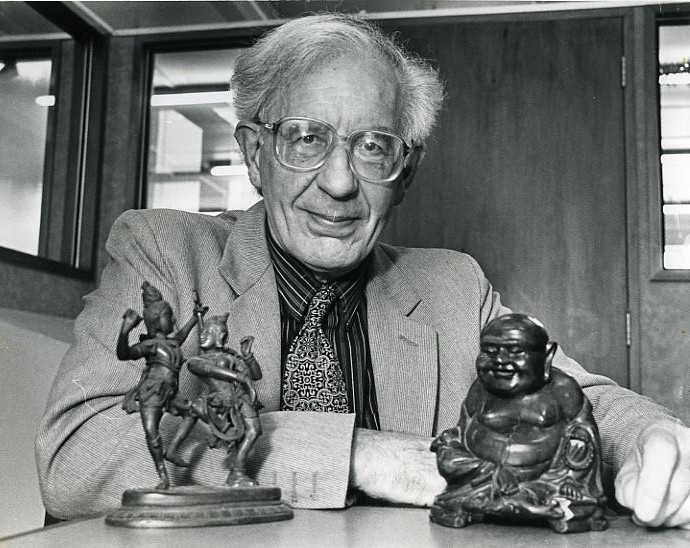Scholar emanated warmth and a sense of inclusion
 By Philip Somerville
By Philip Somerville
Otago Daily Times, February 28, 2009
FORMER students of Albert Moore remember the "icon of the day," a piece of religious art he would bring to class and whose visual impact would resonate with the day’s lecture.
They remember his curiosity, empathy and perceptiveness, his eager, earnest, encouraging ways. It was Prof Moore, a Presbyterian minister, historian and theologian, who in 1967 founded the Phenomenology of Religion discipline at the University of Otago. From beginnings with a handful of students, Prof Moore oversaw its growth stage by stage over 25 years into a thriving corner of intellectual endeavour.
Prof Moore produced an extensive set of slides on world religions to help him with his teaching, to help capture "the value of the visual." With the lights dimmed and the audience stilled, he could find himself more involved in his subject matter, even at times "carried away" like a shaman in a seance, he has written.
His particular specialty grew from his passion for art and he became a world authority on iconography, the publication of the comprehensive and widely used Iconography of Religion: An Introduction in 1977 marking the breadth and detail of his knowledge and interest and the accessibility of his writing. Another major book, Arts in the Religions of the Pacific, appeared in 1995.
He had learned the clarinet as a young adult as he pursued another passion, jazz. Because he was drawn to link aspects of life, it came as no surprise when he wrote and broadcast on religion and jazz.
Prof Moore, who died in Dunedin last month aged 82, was born in Wellington and grew up in Island Bay, Wellington, in Invercargill and the Wairarapa, where his vocational dream for a time was to be a cartoonist. He was accelerated through school and spent a year as a Masterton office boy.
At Victoria University, Wellington, beginning before he turned 17, he studied history and became enmeshed in the Student Christian Movement, so influential for many leaders of his generation. He became a primary school teacher and then came to Dunedin to study for the ministry.
Winning a travelling scholarship, he earned his doctorate in New Testament studies in Manchester and continued with postdoctoral work in Germany. Then it was to Tapanui and parish ministry from 1955 to 1964, where he met and married Alexa (nee Hancox), a Karitane nurse who was home after overseas travel.
They and their two young children next left for Chicago, fired by Prof Moore’s fascination with culture, religion and arts and the chance to study the history of religion. New positions were beginning to open up in teaching religions of the world and Prof Moore was on the staff for a year at the University of Southern Indiana in the mid-western college city of Bloomington. He was housed, as it happened, next to the famous Kinsey Sex Research Institute.
Founding the Otago course, the second in religious studies in New Zealand after Canterbury, Prof Moore settled back into Dunedin, and Opoho. Phenomenology of Religion (or "phenom" as it came to be called colloquially) grew in 10 years from a handful of students to about 160, and added honours, masters and doctoral candidates. The courses are now part of the department of theology and religious studies.
Peter Donovan, who set up the first religious studies course at Massey University in Palmerston North, said Prof Moore was one of the founding fathers of university religious studies in New Zealand. He saw his task as being to help students see, appreciate and empathise with the religious experience of others without rushing in, labelling or engaging in territorial arguments.
One of his fortes was small group dynamics, and he ran week after week for more than 30 years a weekly adult study group at Opoho Presbyterian Church. There he is remembered for being gracious, gentle, generous and without guile, the type of loyal, warm person who engenders affection. Long before "inclusiveness" became a catchcry, he naturally and sympathetically listened and made every person he met feel they had an important contribution.
Forever probing intellectually, he was open to new challenges and experiences. At one time he agreed with the description from a mentor, the philosopher and theologian J.M. Bates, of him as a "responsible radical." Every new person and each new book he encountered held exciting, positive possibilities.
Prof Moore, in his active retirement, continued to explore new ideas and to write and read. He was heavily involved in the University of the Third Age (U3A), helping organise and lead courses. He was on the committee in Dunedin for its first 10 years. Diving was also an interest and he competed in the Masters Games.
He is survived by his wife, children Rachel Ovens and Jonathan and three grandchildren.